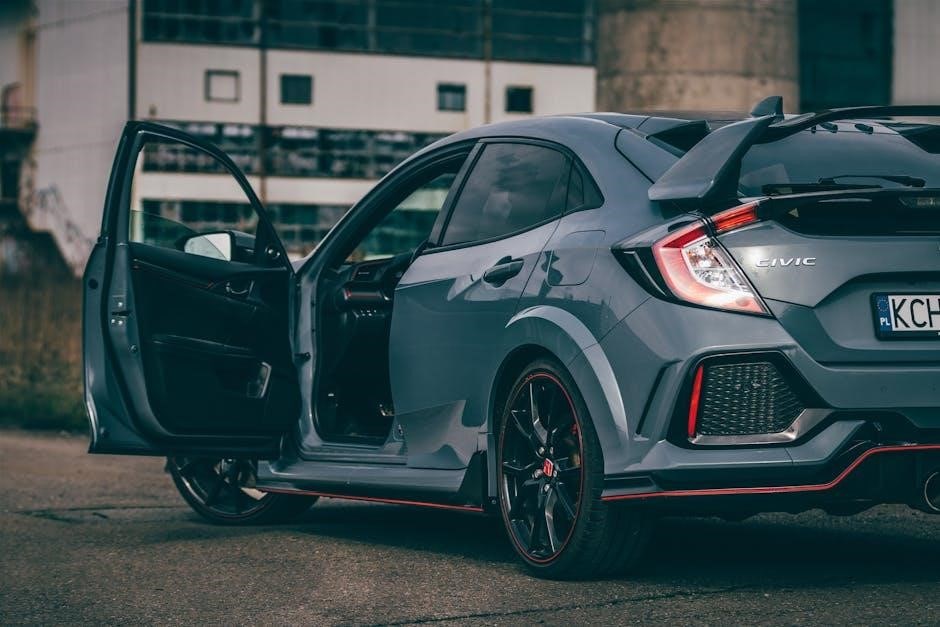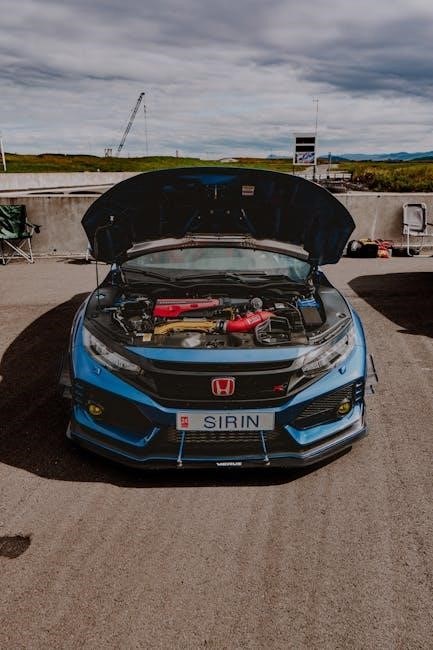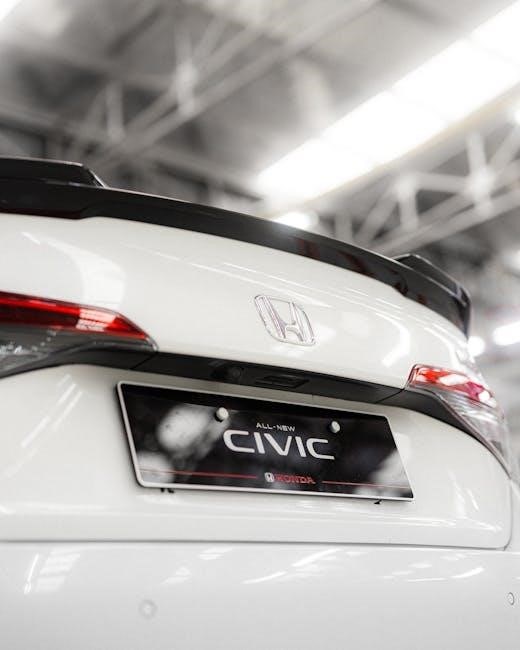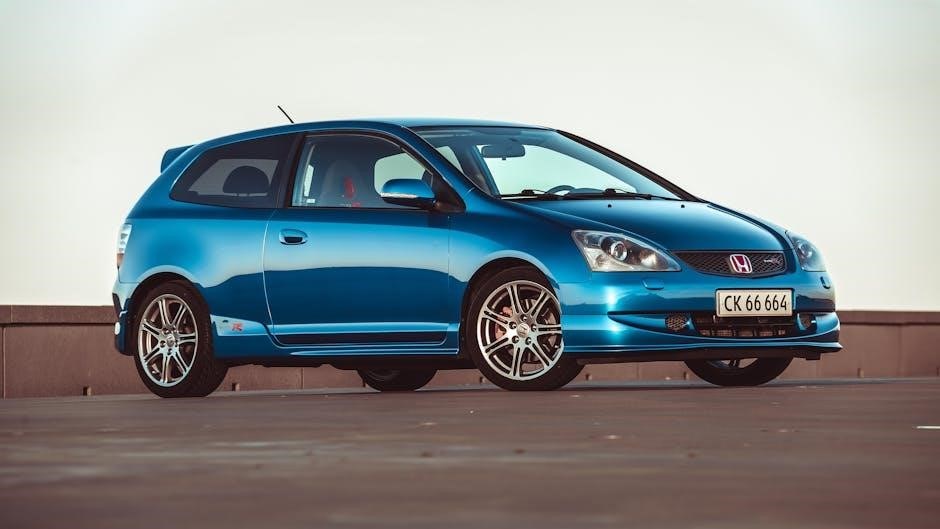
Welcome to your Honda Civic maintenance guide․ Regular upkeep is key to extending the life of your vehicle․ Learn about oil changes‚ tire care‚ and inspections․
Why Regular Maintenance is Crucial for Honda Civic
Regular maintenance is essential for ensuring your Honda Civic performs optimally‚ prevents breakdowns‚ and extends its lifespan․ It helps maintain fuel efficiency‚ reduces emissions‚ and keeps the engine running smoothly․ Neglecting routine checks can lead to costly repairs‚ especially for critical systems like the transmission and brakes․ Regular oil changes‚ tire inspections‚ and fluid checks are vital to avoid issues like oil dilution in cold climates and brake system failures․ By following the recommended schedule‚ you protect your investment and ensure reliability for years to come․ Stay proactive to keep your Civic in peak condition․
Overview of Honda Civic Maintenance Schedule
The Honda Civic maintenance schedule is designed to ensure optimal performance and longevity․ Routine services include oil changes every 10‚000 to 12‚000 miles‚ transmission fluid replacement every 30‚000 miles‚ and coolant drain and fill every 40‚000 miles․ Tire pressure checks‚ brake inspections‚ and air filter replacements are also essential․ The schedule varies by model year and mileage‚ with modern Civics using the Maintenance Minder system to track service needs․ Staying on schedule helps prevent issues like oil dilution in cold climates and ensures your Civic runs smoothly for years․

Oil Change and Fluid Maintenance
Regular oil changes are vital for your Honda Civic’s engine health․ Synthetic oil is recommended for optimal performance․ Check transmission fluid and coolant levels regularly for longevity․
Recommended Oil Types for Honda Civic
For optimal performance‚ use 0W-20 synthetic oil in your Honda Civic․ This viscosity provides excellent fuel efficiency and engine protection in both hot and cold climates․ Synthetic oil lasts longer and performs better under extreme conditions compared to conventional oil․ Always check your owner’s manual for specific recommendations․ Using the wrong oil type can lead to decreased performance or engine damage․ Synthetic oil is ideal for most driving conditions‚ including frequent city driving or long highway trips․
Transmission Fluid Replacement Interval
Honda Civic transmission fluid should be replaced every 30‚000 to 60‚000 miles‚ depending on driving conditions․ Severe use‚ such as frequent stop-and-go traffic‚ may require more frequent changes․ Always use Honda-approved transmission fluid to ensure compatibility and prevent damage․ Regular fluid replacements help maintain smooth gear shifts and extend the lifespan of your transmission; Check your owner’s manual for specific recommendations tailored to your vehicle’s needs and driving habits․

Coolant Drain and Fill Process
Drain and refill your Honda Civic’s coolant every 40‚000 to 50‚000 miles to maintain optimal engine performance․ Use a 50/50 mix of Honda-approved coolant and distilled water․ Before draining‚ ensure the fill plug is accessible to avoid airlocks․ Locate the drain valve at the radiator’s bottom‚ turn it counterclockwise‚ and collect the old coolant․ Once drained‚ tighten the valve and pour the new coolant mixture through the filler cap; Proper coolant maintenance prevents overheating and corrosion‚ ensuring your engine runs smoothly for years․ Always refer to your owner’s manual for specific guidelines․

Tire and Brake Maintenance
Regular tire pressure checks and brake inspections are vital for safety and performance․ Monitor tread wear and balance tires annually to ensure even wear and handling stability․
Tire Pressure Monitoring System (TPMS)
The Tire Pressure Monitoring System (TPMS) in your Honda Civic ensures optimal tire pressure‚ enhancing safety and fuel efficiency․ The system alerts you if pressure drops below recommended levels․ Regular checks are essential‚ especially in cold climates where pressure can decrease․ Use a tire pressure gauge to verify accuracy and reset the system after adjustments․ Proper TPMS maintenance helps prevent tire damage and improves overall vehicle performance․ Always refer to your owner’s manual for specific instructions on recalibrating the TPMS after tire changes or rotations․
Brake Pad Replacement Guidelines
Brake pads are essential for your Honda Civic’s safety and performance․ They should be replaced every 30‚000 to 50‚000 miles‚ depending on driving conditions․ Look for signs of wear‚ such as squealing noises‚ spongy brake feel‚ or vibrations when braking․ Inspect pads regularly and replace them when thickness falls below 1/8 inch․ Proper replacement ensures reliable stopping power and prevents damage to rotors․ Always use genuine or high-quality pads designed for your Civic’s specifications․ Neglecting brake maintenance can lead to reduced safety and increased repair costs․


Essential Maintenance Services
Regular maintenance services are vital for your Honda Civic’s longevity․ These include oil changes‚ tire rotations‚ air filter replacements‚ and coolant flushes․ Stay proactive to ensure optimal performance and reliability․
Spark Plug Replacement Interval
Spark plugs in your Honda Civic typically need replacement every 30‚000 to 100‚000 miles‚ depending on the type․ Copper spark plugs have a shorter lifespan‚ while platinum or iridium plugs can last longer․ Regular inspections are crucial to avoid engine misfires and reduced fuel efficiency․ If you notice poor performance or a decrease in mileage‚ it may be time to replace them․ Always refer to your owner’s manual or consult a mechanic for precise recommendations tailored to your vehicle’s condition and mileage․
Air Filter and Cabin Filter Maintenance
Regular replacement of your Honda Civic’s air and cabin filters is essential for optimal performance․ The engine air filter should be inspected every 15‚000 to 30‚000 miles and replaced when dirty to ensure proper airflow and fuel efficiency․ The cabin air filter‚ which improves interior air quality‚ should be replaced every 12‚000 to 18‚000 miles or when you notice reduced heating/cooling performance․ Check both filters for dirt or odors and replace them as needed to maintain a clean and efficient driving environment․
Timing Belt Replacement Recommendations
The timing belt in your Honda Civic plays a critical role in synchronizing engine components․ It is typically recommended to replace the timing belt between 90‚000 and 105‚000 miles‚ depending on the model year and driving conditions․ Neglecting this can lead to costly engine damage if the belt fails․ Many technicians also recommend replacing the water pump at the same time‚ as it is driven by the timing belt․ Always consult your owner’s manual or a certified mechanic for precise recommendations tailored to your vehicle․

Regular Inspections and Checks
Regular inspections are vital for maintaining your Honda Civic’s performance․ Check oil levels‚ brake fluid‚ and antifreeze regularly․ Inspect belts‚ hoses‚ and tires for wear․ Address issues promptly․
How to Check Oil Levels and Condition
To check your Honda Civic’s oil‚ ensure the car is on level ground and turned off․ Open the hood and locate the oil dipstick․ Pull it out‚ wipe it clean with a cloth‚ and insert it back․ Pull it out again to see the oil level․ The oil should be between the “MIN” and “MAX” marks․ Check the color: amber or light brown indicates good condition‚ while dark or black oil may need changing․ Also‚ inspect for consistency—thick oil may signal issues․ If the oil smells burnt‚ address it promptly․ Regular checks help prevent engine damage and ensure optimal performance․
Inspecting Brake Fluid and Antifreeze Levels
Check the brake fluid level by locating the transparent reservoir under the hood․ Ensure the level is between the “MIN” and “MAX” marks․ If low‚ top up with the recommended DOT-rated fluid․ For antifreeze‚ find the coolant reservoir and verify the level is within the specified range․ Check the color: green‚ yellow‚ or orange indicates good condition‚ while murky or dark fluid may need flushing․ Always use a 50/50 mix of antifreeze and water․ Avoid mixing brake fluid types‚ and never top off brake fluid without professional guidance․ Inspect these fluids regularly to prevent overheating and braking issues․ Schedule a professional flush every 30‚000 miles for optimal performance․ If levels drop suddenly‚ investigate for leaks or system damage․ Regular inspections ensure your Honda Civic runs smoothly and safely‚ especially in extreme weather conditions․ Always refer to your owner’s manual for specific recommendations tailored to your vehicle․ If unsure‚ consult a certified mechanic to avoid costly repairs․ Proper maintenance of these fluids is crucial for extending the lifespan of your car and ensuring reliability on the road․ Keep track of your maintenance schedule to stay ahead of potential problems․ If you notice any unusual signs‚ such as leaks or discoloration‚ address them promptly to prevent further damage․ By staying proactive‚ you can enjoy a safer and more efficient driving experience․ Remember‚ consistent checks and timely replacements are key to maintaining your Honda Civic’s performance and longevity․ If you’re unsure about any step‚ don’t hesitate to seek professional advice to ensure everything is done correctly․ Regular maintenance not only protects your investment but also ensures your safety on the road․ Stay informed and keep your Honda Civic in top condition with routine inspections and necessary adjustments․ If you live in an area with extreme temperatures‚ pay extra attention to your coolant levels to prevent engine damage․ Always use high-quality products that meet Honda’s specifications to maintain your vehicle’s warranty and performance standards․ If you notice any signs of wear or contamination‚ don’t delay in addressing them to avoid more severe issues down the road․ Your Honda Civic deserves the best care‚ and proper fluid maintenance is a cornerstone of that care․ By following these steps‚ you can ensure your car runs efficiently and reliably for years to come․ Stay vigilant and keep your Honda Civic in excellent shape with regular checks and timely maintenance․ If you’re ever in doubt‚ consult your owner’s manual or reach out to a trusted mechanic for guidance․ Proper fluid levels and condition are essential for your car’s health‚ so make them a priority in your maintenance routine․ Keep your Honda Civic performing at its best by staying on top of brake fluid and antifreeze inspections; If you notice any issues‚ don’t wait—act promptly to protect your vehicle․ Regular maintenance is an investment in your car’s longevity and your safety on the road․ Stay proactive and keep your Honda Civic running smoothly with consistent checks and care․ If you’re unsure about any aspect of fluid maintenance‚ seek professional advice to ensure everything is handled correctly․ Your car’s performance and reliability depend on it․ By following these guidelines‚ you can enjoy a trouble-free driving experience and extend the life of your Honda Civic․ Stay informed‚ stay safe‚ and keep your car in peak condition with regular inspections and timely maintenance․ If you ever encounter a problem‚ address it immediately to prevent further complications․ Your Honda Civic is a valuable asset‚ and proper care will ensure it serves you well for many miles․ Remember‚ consistent attention to brake fluid and antifreeze levels is vital for your car’s health and performance․ Stay on top of your maintenance schedule and enjoy the benefits of a well-maintained vehicle․ If you have any concerns‚ don’t hesitate to consult a professional to ensure your car receives the care it needs․ By prioritizing regular inspections‚ you can avoid costly repairs and keep your Honda Civic running like new․ Stay proactive‚ stay informed‚ and keep your car in excellent condition with proper fluid maintenance․ If you’re ever unsure about any step‚ seek guidance to ensure your car receives the best care possible․ Your Honda Civic’s performance and longevity depend on consistent and thorough maintenance․ Stay committed to regular checks and enjoy the reliability and efficiency of your vehicle․ If you encounter any issues‚ address them promptly to protect your investment․ Proper fluid maintenance is a critical part of keeping your car in top shape‚ so make it a priority in your routine․ By following these steps‚ you can ensure your Honda Civic continues to perform at its best for years to come․ Stay vigilant‚ stay proactive‚ and keep your car running smoothly with regular inspections and timely care․ If you’re ever in doubt‚ don’t hesitate to seek professional advice to ensure your car receives the attention it needs․ Your Honda Civic deserves the best‚ and with proper maintenance‚ it will provide you with years of reliable service․ Stay informed‚ stay safe‚ and keep your car in peak condition with consistent attention to brake fluid and antifreeze levels․ If you notice anything unusual‚ address it immediately to prevent further damage․ Regular maintenance is an investment in your car’s future‚ ensuring it remains a trusted companion on the road․ By prioritizing these checks‚ you can enjoy a safer and more efficient driving experience․ Stay proactive and keep your Honda Civic in excellent shape with proper fluid maintenance․ If you’re unsure about any aspect‚ consult a professional to ensure your car is well cared for․ Your Honda Civic’s performance and longevity are in your hands‚ so make regular inspections a priority․ Stay on top of your maintenance schedule and enjoy the benefits of a well-maintained vehicle․ If you ever encounter a problem‚ address it promptly to protect your car and ensure your safety on the road․ Proper fluid maintenance is essential for your car’s health‚ so stay informed and take action when needed․ By following these guidelines‚ you can keep your Honda Civic running smoothly and extend its lifespan․ Stay proactive‚ stay safe‚ and keep your car in top condition with regular checks and timely maintenance․ If you’re ever unsure‚ seek professional advice to ensure your car receives the care it deserves․ Your Honda Civic is a valuable investment‚ and proper maintenance will ensure it serves you well for many years․ Stay committed to regular inspections and enjoy the reliability and efficiency of your vehicle․ If you notice any issues‚ address them immediately to prevent further complications․ Proper fluid maintenance is crucial for your car’s performance and longevity‚ so make it a priority in your routine․ By following these steps‚ you can ensure your Honda Civic continues to run smoothly and efficiently․ Stay vigilant‚ stay proactive‚ and keep your car in excellent condition with regular attention to brake fluid and antifreeze levels․ If you’re ever in doubt‚ don’t hesitate to consult a professional to ensure your car is properly maintained․ Your Honda Civic’s health and performance depend on consistent care‚ so stay on top of your maintenance schedule․ Enjoy the benefits of a well-maintained vehicle and stay safe on the road․ If you encounter any problems‚ address them promptly to protect your car and ensure your safety․ Proper fluid maintenance is a key part of keeping your car in top shape‚ so prioritize regular inspections and necessary adjustments․ By staying proactive‚ you can enjoy a trouble-free driving experience and extend the life of your Honda Civic․ Stay informed‚ stay safe‚ and keep your car running smoothly with consistent attention to brake fluid and antifreeze levels․ If you’re ever unsure‚ seek professional guidance to ensure your car receives the best care possible․ Your Honda Civic deserves nothing less than the best maintenance‚ and with regular checks‚ it will reward you with years of reliable service․ Stay proactive‚ stay vigilant‚ and keep your car in peak condition with proper fluid maintenance․ If you notice any issues‚ don’t wait—act promptly to protect your investment․ Regular inspections and timely maintenance are essential for your car’s health and performance‚ so make them a priority․ Stay committed to keeping your Honda Civic in top shape and enjoy the benefits of a well-maintained vehicle․ If you’re ever in doubt‚ consult a professional to ensure your car is properly cared for․ Your Honda Civic’s longevity and reliability depend on consistent maintenance‚ so stay on top of your schedule and keep your car running smoothly․ Address any issues promptly to prevent further damage and ensure your safety on the road․ Proper fluid maintenance is vital for your car’s performance‚ so make regular checks a part of your routine․ By following these steps‚ you can keep your Honda Civic in excellent condition and enjoy a safe and efficient driving experience․ Stay proactive‚ stay informed‚ and prioritize your car’s maintenance to ensure it continues to serve you well for years to come․ If

Honda Maintenance Minder System

Tools and Tips for DIY Maintenance
Gather essential tools like a socket set‚ oil drain pan‚ and torque wrench․ Follow DIY guidelines and safety precautions for efficient Honda Civic maintenance․